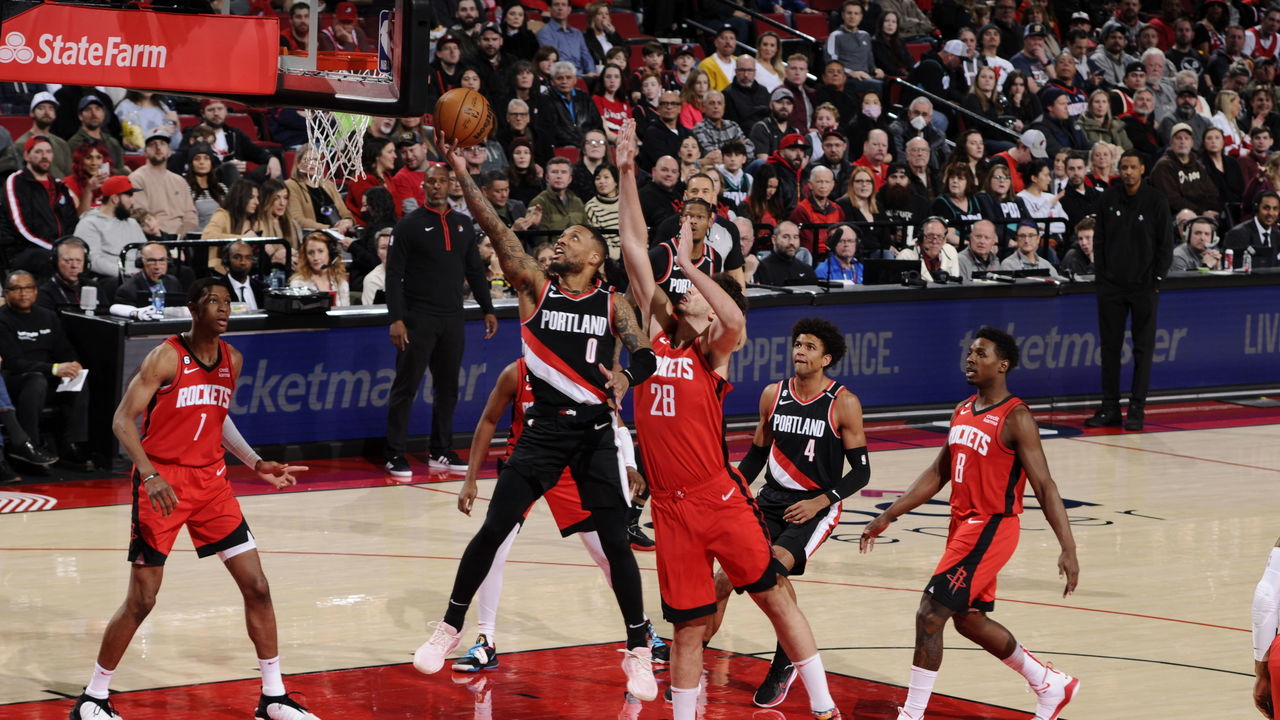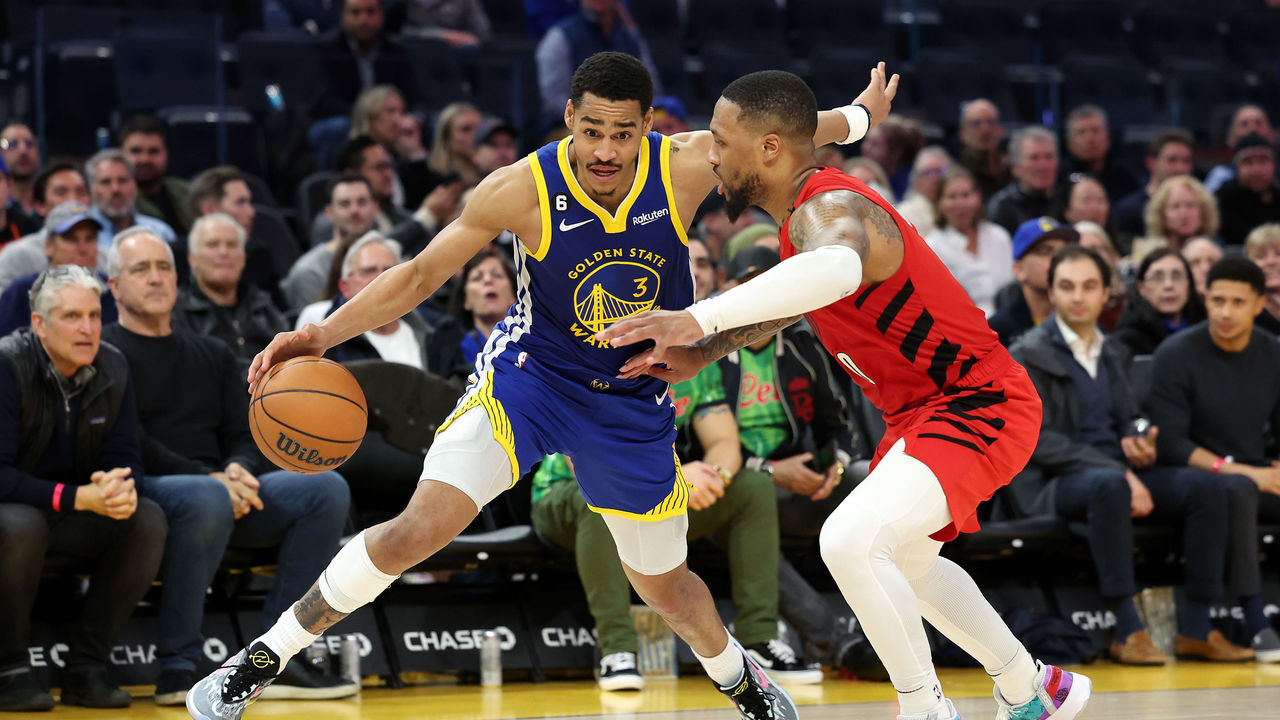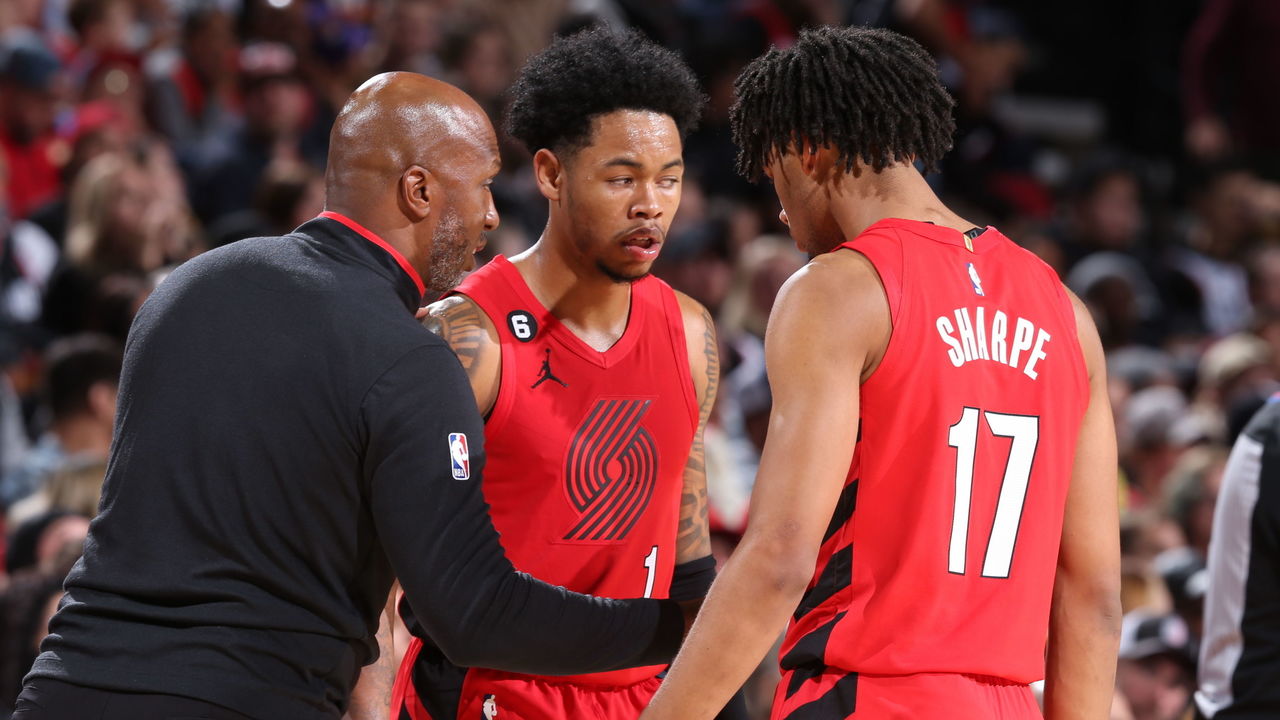Dame is better than ever, but the Blazers are stuck in quicksand
Damian Lillard's nuclear 71-point explosion Sunday night was jaw-dropping and somehow not all that surprising. The second-highest regulation scoring output of the 3-point era was the culmination of a long-simmering hot streak that's seen Lillard incinerate almost every defense he's come across.
It was his second game this season with at least 60 points, his third with at least 50, and his NBA-leading 12th with 40 or more (he's since added a 13th). Heck, Lillard's almost averaged 40 over the last seven weeks. He's at 38.8 points and seven assists on 52/40/96 shooting during that 21-game stretch.
His averages for the season clock in at "only" 32.3 and 7.1, numbers he's compiled while shooting 59% from 2-point range, 38% from deep (on a league-high 11.2 attempts per game), and 92% from the free-throw line. There have been only three seasons in NBA history in which a player averaged at least 30 points on at least 65% true shooting. Adrian Dantley hit those benchmarks with Utah back in 1983-84 and Steph Curry did it twice, first during his incandescent repeat MVP season in 2015-16 and then again in 2020-21. If the season ended today, Lillard would join that list.
At age 32, in his 11th season, he continues to add layers to his Hall of Fame-caliber game. Lillard has always been lauded primarily for his off-the-bounce shooting and preposterous range, and for good reason; he's ranked in the top five in pull-up threes per game every year he's been in the NBA, and this season he's hit 37.6% of them on league-high volume.
But his dribble-drive game has become an essential part of his still-evolving offensive package. He's become a more ambidextrous attacker and finisher; he's improved his touch and creativity around the rim; and, as a 6-foot-2 guard with a 6-foot-7 wingspan, he's gotten better at shielding the ball and timing up full-extension finishes to elude rim-protectors.
His 30% at-rim attempt rate this season puts him in the 80th percentile among point guards, and his 65% conversion rate on those shots is the highest mark of his career, per Cleaning the Glass. He ranks ninth in the league in drives per game (15.8) and is shooting 58.6% on his drives, almost identical to the marks posted by Zion freaking Williamson, according to NBA Advanced Stats.

Lillard's driving game and pull-up prowess are obviously not mutually exclusive. His ability to bury shots from anywhere when given even the tiniest sliver of space means defenders (be they on-ball in isolation or screen defenders in pick-and-roll) need to press all the way up, so he doesn't even need a particularly quick first step to dust guys off the bounce. He uses devastating hesitation dribbles to paralyze defenders with the fear of his step-back before zooming past them to the cup. And while Lillard isn't the most explosive guard in the world, he changes pace as rapidly as anyone and has enough straight-line speed to power past the second line of defense once he's blown by the first.
He's never been more versatile in the ways he's able to use ball screens. He's better than ever at turning the corner to beat hedges and high drops, better than ever at rejecting screens and at setting defenders up to slam into them. He splits traps in a variety of ways, from standard crossovers to behind-the-back dribbles to spin-back moves. (A personal favorite: when he uses the first screen in a double-drag action and then feigns using the second one before either going straight into a pull-up or exploding through the narrow seam between the two.)
He's been dominant in every guard-centric play type this season. Per NBA Advanced Stats, his 1.15 points per possession as a pick-and-roll ball-handler rank second only to Steph Curry among players averaging at least five such possessions per game. His 1.2 points per possession as an isolation scorer put him second to Kyrie Irving among players with at least 100 isos. He also ranks in the 88th percentile as a scorer out of dribble-handoff actions (1.22) and the 84th percentile on plays in which he uses off-ball screens (1.16). And that doesn't even account for the heady reads and zippy passes that leverage all the defensive attention he receives.
All of which is to say: This Lillard season should be remembered as an all-timer. He's playing not only the best basketball of his career but some of the best offensive basketball ever played by anyone. But it seems destined to be dimmed in the collective memory because the Blazers simply aren't a good team. They're 29-33, loitering on the fringes of the play-in race, with a bottom-10 net rating and one of the worst defenses in basketball.
They've surrendered 117 points per 100 possessions, more than all but the three teams that make up the league's tanking vanguard in San Antonio, Houston, and Detroit. That's why even this torrid 21-game run Lillard has put together has only resulted in a 10-11 Blazers record and a dead neutral point differential during his minutes on court.
Lillard has to wear some of that. He's an abjectly poor defender - helpless in man coverage, shaky as a screen navigator, ineffectual as a low man - and opposing teams readily exploit those limitations. Even the Warriors, a team that is stylistically and philosophically averse to mismatch-hunting, targeted him relentlessly in their comeback-turned-blowout win Tuesday.

The Blazers do their best to shade help his way, but that puts them in rotation and leads to them getting gashed by cuts and skip passes. Their conundrum is not dissimilar to Atlanta's with Trae Young: They can't score with Lillard on the bench, and they can't defend with him on the floor.
It doesn't help that he's usually flanked in the backcourt by Anfernee Simons, who has enough trouble handling his own assignments without being relied upon to provide cover for someone else. Portland plays a lot of zone and that helps protect those guys, but that scheme has its own vulnerabilities that get easier to attack the more opponents see it.
Still, it feels like things shouldn't be quite this bad. Plenty of teams have managed to build sound defensive infrastructures around shoddy defensive guards, including the Blazers not that long ago. Even with Lillard and CJ McCollum starting together, they finished sixth in defensive efficiency in 2017-18 and a respectable 16th the following season, which is the year they reached the acme of the Lillard era with 54 wins and a West finals berth. They've ranked no higher than 27th in any of the four seasons since.
This is despite two separate front offices making every attempt to surround Lillard and his various backcourt mates with defensive insulation in the meantime. Robert Covington, Larry Nance, Derrick Jones Jr., Josh Hart, and Gary Payton II came and went without moving the needle. McCollum was shipped out, and the same problems persisted. Jerami Grant, Nassir Little, Justise Winslow, and newly acquired Matisse Thybulle remain and still Portland can't get stops.
Maybe that's because they lack size in the middle behind Jusuf Nurkic, who has missed extended time with an injury for the fourth straight year and hasn't played in a month. Though he doesn't really get off the ground or move well laterally anymore, Portland has actually defended at a league-average level with their 7-foot bruiser on the court. Without him, the Blazers have no back-line rim deterrence, which compounds their flimsiness at the point of attack. No team allows a higher frequency of shots at the rim.
Coach Chauncey Billups' base scheme doesn't make sense for the personnel on hand. It asks Nurkic and backup center Drew Eubanks to come out to the perimeter either to hedge or outright switch, which consequently tasks their overmatched smalls with rotating on the back side. Maybe Al-Farouq Aminu was really that important. Maybe the league at large has gotten way better at attacking defensive weak spots and a team like the 2018-19 Blazers could never achieve that kind of success today.

Maybe bad health luck is to blame. Payton didn't suit up until January after offseason surgery, then appeared in 15 games before being traded. Little missed extended time in the season's first half. Winslow, maybe the team's most impactful defender in the early going, hasn't played since December.
But every team deals with injuries, and it's not like the Blazers have been particularly snakebitten compared to the rest of the league. So maybe the personnel is truly just this bad. Lillard is what he is, and Simons is a worse defender than McCollum was at his best. Shaedon Sharpe tantalizes with his tools, but he's a rookie who very much defends like one. (He doesn't so much navigate screens as find himself inexorably drawn toward them, like a moth to a lantern.) Even when healthy, Nurkic can't clean up messes like he used to. Grant is an excellent help defender but he's closer to average on the ball.
Lillard and Nurkic are the only Blazers left from that conference finals squad - even the GM and coach have been turned over - but all that rejiggering has proven to be the flailing of a team in quicksand, getting more and more entrenched in the muck the harder it tries to escape. If the Blazers can't keep their heads above the surface with Lillard playing like this, after all the shuffling they've done to remake the roster around him, where do they go from here?
The trade deadline suggested GM Joe Cronin and staff aren't entirely sure yet. They hedged a bit and settled on being conservative sellers, exchanging Hart and Payton for a first-rounder, a bundle of seconds, and fliers on Thybulle (who's looked good so far) and Cam Reddish. More big decisions loom this summer, with Grant set to command a huge new deal and the two new imports slated for restricted free agency.
How many realistic avenues to upward mobility are available to this team? Would finding a more reliable center option than Nurkic make the difference? Can Sharpe make a major leap while Lillard's still in his prime? Will they eventually explore trading Simons for more defensive help, even though doing so might leave them precariously light on secondary shot creation? Is Lillard good enough to carry the offense on his own?
One way or another, the Blazers have work to do if they want to salvage the late prime of the greatest player in franchise history. But there are no easy answers and the clock is ticking.